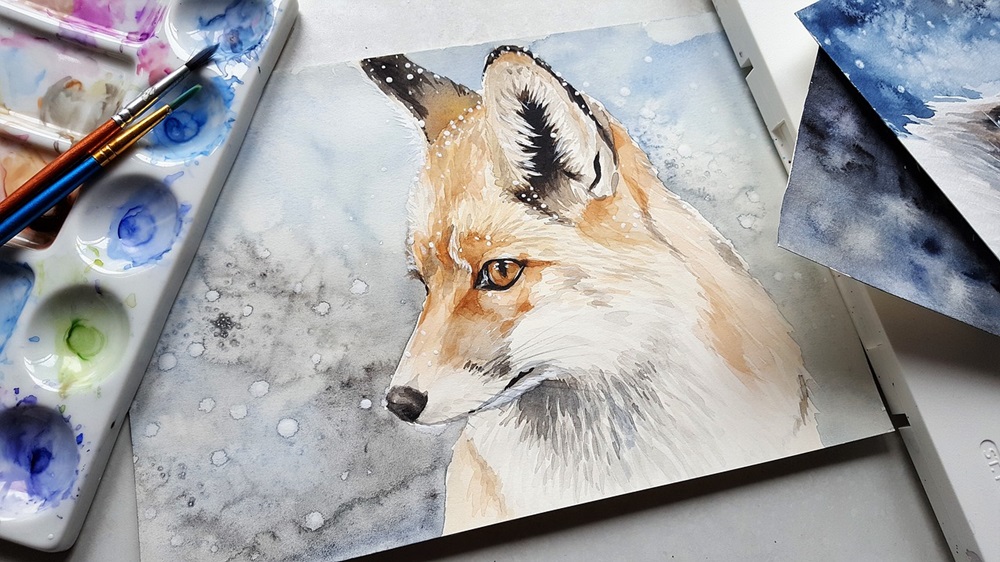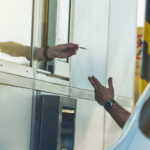Scammers are hitting the arts community with an alluring art commission scam to squeeze money from artists. They’ll send you a quick message on social media asking if you take commissions, but they have no intention of paying.
Why Is It Important to Be Aware of This Scam?
If you’re an artist, you should be aware of this scam to prevent financial loss.
Scam Detectors Most Trusted Websites in Online Security
- Guard.io (100): Surf the web safely. Clean up your browser, remove malicious extensions and check for privacy violations.
- Incogni.com (100): Delete your personal data from the internet and protect against scams and identity theft.
- ExpressVPN (100) Stay secure and anonymous online - Best VPN Out There
Apart from the financial and time impact, this scam can also cause emotional damage, making you lose trust in potential clients. Your emotional welfare is paramount if you want to create fantastic artwork. The emotional toll of a scam can affect your creativity and motivation.
If you’re a new artist, the risk of falling victim to this scam is higher simply because you’re new to this world.
How the Art Commission Scam Works
Scammers will typically contact you on social media, asking if you take commissions for your artwork. They’ll say they love your work and quickly sell you an emotional story, asking you to make a portrait of their pets, someone they loved who passed away, and so on.
If you agree, they will ask if they can pay via PayPal. If you tell them you prefer a different payment method, they’ll insist on using PayPal and transferring the money as soon as possible.
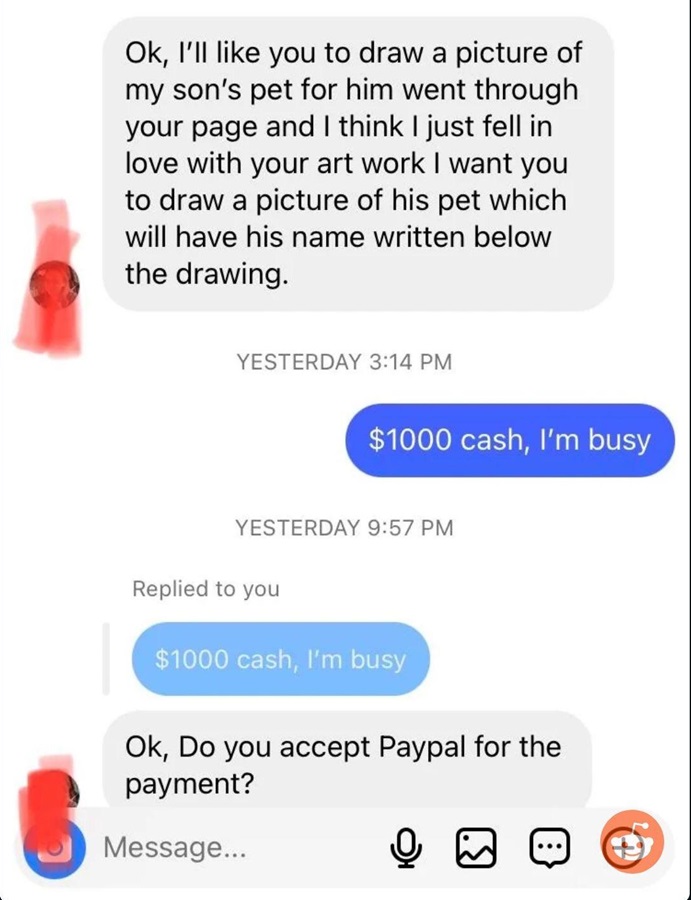
Their aim is to get your PayPal email address and name.
Once you give them your PayPal information, you’ll soon get a fake PayPal email asking you to pay a fee for PayPal to release the funds to your account.
Don’t click on any of the emails or links you get from scammers.
If you do, you’ll be redirected to a fake website impersonating PayPal, where you’re asked to enter your credentials to log in. As you might guess, scammers use these fake websites to steal your credentials and empty your PayPal account.
Unfortunately, many artists don’t think twice before paying because the request seems legitimate. Their “client” has confirmed they paid for the artwork in advance, and the simplest thing to do is to pay the fee to get the funds released to their account.
Variations of the Art Commission Scam
The Commission Variant
In this scenario, scammers will contact you via social media or email and ask you to create a commissioned artwork for them. They won’t give you any details or guidelines about their desired artwork. Instead, they’ll praise your work and quickly offer to pay in advance so they can get your PayPal email and name.
Once they have your PayPal email address, they’ll send you an email with a malicious link that directs you to a fake PayPal website used to steal your credentials.
In a subvariant of this scam, when you ask for payment, they’ll say PayPal already sent you an email. This isn’t true. They are sending you a fake PayPal email.
The email will say you got the money, but there’s a problem because your account isn’t a business account and has a limit. This is all fake. Their goal is to convince you to send them the money they’re requesting as a refund.

If you share your PayPal email address and chat with the scammers live, they’ll claim they’re having technical issues with the payment. They’ll blatantly say they need a special code that PayPal sent to your phone to confirm the transfer.
Don’t fall for this tactic. Never share your PayPal security code with anyone. They’re actually trying to log into your PayPal account. They’re asking for your security code, which they need to hack into your account.
The Check Scam
In this scenario, scammers will insist they can only pay by check. In reality, they want to send you a fake check with an overpayment.
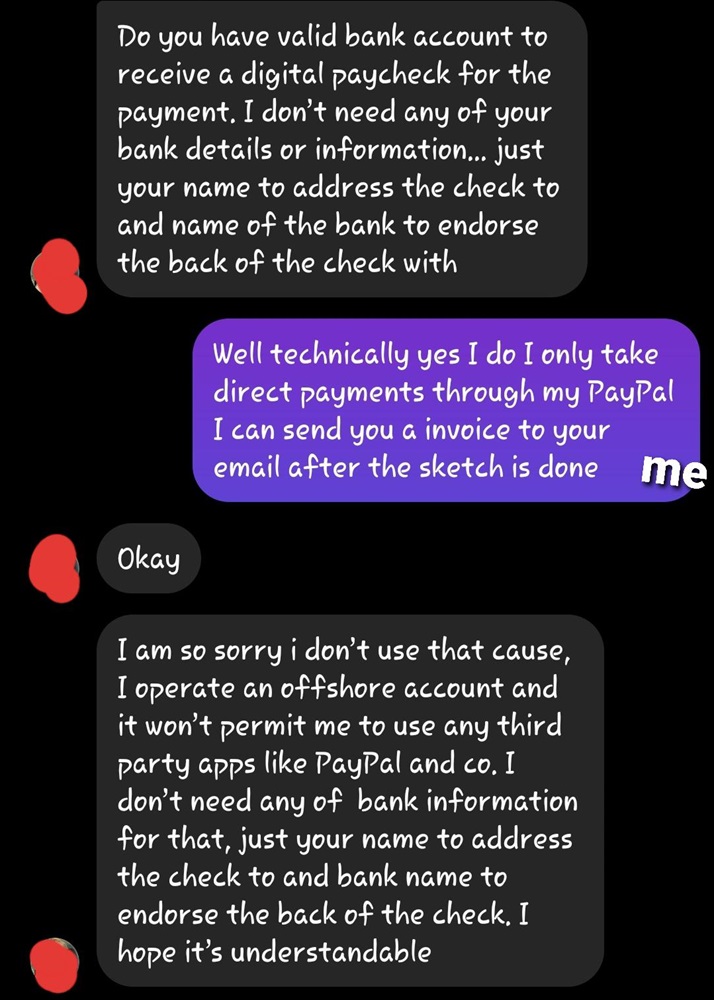
They’ll wait until you cash the check to say they accidentally added an extra zero. Then, they’ll make you pay back the extra money before the bank catches the mistake.
If their plan works, they’ll keep the money and disappear.
Promotion and Followers
Scammers may also contact you out of the blue, offering their services to help you promote your artwork and gain more followers on social media. Typically, Instagram is the social media network targeted by scammers aiming to scam artists.
They’ll promise to promote your work and help you gain thousands of new followers for a small fee.
Of course, there’s no real promotion service involved here. Their goal is to get you to share personal information and pay for a service they will never deliver.
NFT Scams
In this art commission scam, victims are asked to register their artwork as NFTs. If someone contacts you to buy your artwork as an NFT, the chances are pretty high that it’s a scam.
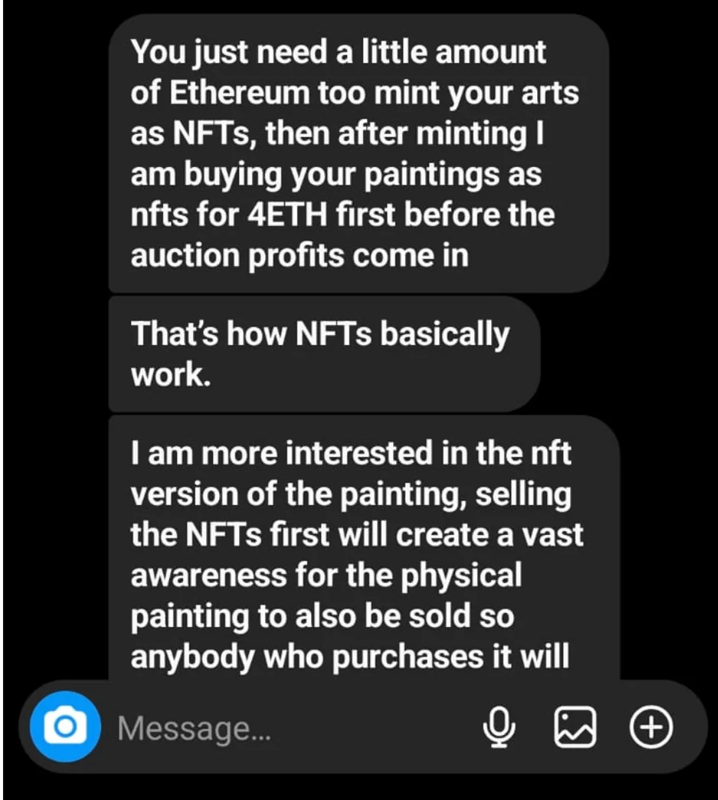
People who ask you to turn your artwork into NFTs are not interested in your art. They’re interested in your personal information. That’s more valuable to them, so they’re trying to lure you with a high price for your NFTs.
Common Red Flags
Even though scammers say they love your artwork, if you check their profile, you’ll see they don’t follow you. They probably haven’t liked any of your art pieces and haven’t posted anything on their profile, either. Some of the profiles that scammers use are private or empty.
Another major red flag is their lack of specific instructions. They keep the instructions extremely vague and general. A person who appreciates art and wants something custom-made will give you a long list of details and guidelines to follow.
Another tip-off is their impatience. They often offer to pay for your artwork immediately and at a much higher price than your typical rate. If you take more than a few minutes to reply to their messages, they’ll send you many question marks, pressuring you to respond.
If you refuse to provide your PayPal email and name, they’ll continue to ask you to accept the PayPal transfer because it’s the easiest way. The fact that they insist so much on PayPal should make you think that’s all they care about, not your art. Their insistence reveals their true plans. As the vendor, you set the price, payment method, and timing. If anyone tries to control any of these, it’s a red flag.
The fact that they’re offering a lot more money than your standard rates should definitely make you suspicious.
Scamming campaigns are often operated by non-native English speakers. Their messages are riddled with grammar and spelling errors despite using English names in their profiles. They don’t even bother to use a writing assistant to improve grammar and spelling. All they care about is money.
Another tip-off is excessive praising. Scammers do this to soften you up and make you follow their instructions to the letter.
How to Protect Yourself Against Art Commission Scams
Don’t wire money to anyone who contacts you out of the blue. Never pay any so-called advance fees to unlock a hefty PayPal transfer. Remember that PayPal transfers can be withdrawn.
Don’t share personal details online. Don’t give details like your PayPal email address or other personal information. Scammers will use them to hack into your account or steal your identity.
Don’t click on emails or links that you didn’t ask for. Always check the URL and security certificate of the websites you’re visiting to ensure their safety.
When sharing your artwork, you should be the one to choose the payment method. If you’re using PayPal, use PayPal Invoicing to secure transactions. The client will need to provide their email address, not the other way around.
Don’t follow the scammers’ instructions mindlessly. Don’t let the promise of earning more-than-average money and excessive praising lower your guard. Scammers want you to act on emotion. If something sounds too good to be true, it probably is. Trust your gut instinct.
Test the people who contact you for commissioned artwork. If they like your work so much, ask them what they like about your style and what piece from your portfolio they like most. Scammers won’t be able to get into specific details because they are not interested in your portfolio.
They only praise your artwork to establish an emotional connection with you and get you to follow their instructions mindlessly. Once you’re sure you’re talking to a scammer, the best approach is to stop engaging with them. Block them immediately and delete the messages you’ve exchanged with them. Make sure to report them to the security team of the social media network they contacted you on to prevent them from scamming others.
Conclusion
Social media, and Instagram in particular, are great tools for artists to promote their artwork. Unfortunately, spammers lurk on these platforms, trying to trick artists into sharing their PayPal details in order to hack their accounts.
To avoid falling victim to scammers, always stay in control of your transactions. Set clear terms for price, and payment methods. Stick to secure and verified payment methods. Be wary of anyone trying to change these terms.
Trust your instincts and avoid deals that feel off. If something seems too good to be true, it probably is.

TOP 4 MUST-WATCH FRAUD PREVENTION VIDEOS
1. Top 5 Amazon Scams in 2024 2. Top 5 PayPal Scams in 2024 3. How To Spot a Scam Email in 2024- Latest Posts by Madalin Dinita
-
The Muse Scams: How Fake Modeling Offers Target Your Pocket
- -
Crypto Airdrop Scams: How to Keep Your Wallet Safe
- -
Don’t Fall for the Falling Lady Scam
- All Posts


